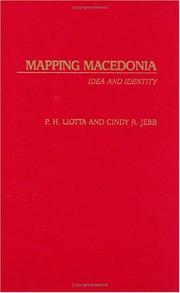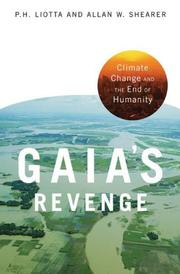| Listing 1 - 10 of 11 | << page >> |
Sort by
|
Book
ISBN: 1884733190 Year: 2002 Publisher: [s.l.] : US Naval War College,
Abstract | Keywords | Export | Availability | Bookmark
 Loading...
Loading...Choose an application
- Reference Manager
- EndNote
- RefWorks (Direct export to RefWorks)
Book
ISBN: 1612341071 9781612341071 9781597975513 1597975516 Year: 2012 Publisher: Washington, D.C. : Baltimore, Md. : Potomac Books, Project MUSE,
Abstract | Keywords | Export | Availability | Bookmark
 Loading...
Loading...Choose an application
- Reference Manager
- EndNote
- RefWorks (Direct export to RefWorks)
Cities out of control
Overpopulation. --- Security, International. --- Cities and towns --- Urban density. --- Urban population density --- Population density --- Urban ecology (Sociology) --- Growth, Urban --- Sprawl, Urban --- Urban development --- Urban growth --- Urban sprawl --- Migration, Internal --- Population --- Vital statistics --- Collective security --- International security --- International relations --- Disarmament --- International organization --- Peace --- Population explosion --- Growth. --- Urban density --- Security, International --- Overpopulation --- Growth --- E-books --- #SBIB:314H284 --- #SBIB:39A4 --- Demografie en sociale demografie --- Toegepaste antropologie

ISBN: 0275982475 Year: 2004 Publisher: Westport (Conn.) : Praeger,
Abstract | Keywords | Export | Availability | Bookmark
 Loading...
Loading...Choose an application
- Reference Manager
- EndNote
- RefWorks (Direct export to RefWorks)
Macedonian question. --- Balkan Peninsula --- Macedonia (Republic) --- Macedonia (Republic) --- Politics and government --- Ethnic relations --- Political aspects. --- Politics and government

ISBN: 0275987973 Year: 2007 Publisher: Westport (Conn.) : Praeger Publishers,
Abstract | Keywords | Export | Availability | Bookmark
 Loading...
Loading...Choose an application
- Reference Manager
- EndNote
- RefWorks (Direct export to RefWorks)
Environmental degradation. --- Environmental policy. --- Geopolitics. --- Human beings --- Human ecology. --- Nature --- Effect of environment on. --- Effect of human beings on.
Book
ISBN: 9781402085499 Year: 2008 Publisher: Dordrecht Springer
Abstract | Keywords | Export | Availability | Bookmark
 Loading...
Loading...Choose an application
- Reference Manager
- EndNote
- RefWorks (Direct export to RefWorks)
Book
ISBN: 9781402085512 Year: 2008 Publisher: Dordrecht Springer Science + Business Media B.V
Abstract | Keywords | Export | Availability | Bookmark
 Loading...
Loading...Choose an application
- Reference Manager
- EndNote
- RefWorks (Direct export to RefWorks)
Environmental and Human Security: Then and Now 1 2 ALAN D. HECHT AND P. H. LIOTTA * 1 U. S. Environmental Protection Agency Office of Research and Development 2 Pell Center for International Relations and Public Policy Salve Regina University 1. Nontraditional Threats to Security The events of September 11, 2001 have sharpened the debate over the meaning of being secure. Before 9/11 there were warnings in all parts of the world that social and environmental changes were occurring. While there was prosperity in North America and Western Europe, there was also increasing recognition that local and global effects of ecosystem degradation posed a serious threat. Trekking from Cairo to Cape Town thirty years after living in Africa as a young teacher, for example, travel writer Paul Theroux concluded that development in sub-Saharan Africa had failed to improve the quality of life for 300 million people: Africa is materially more decrepit than it was when I first knew it hungrier, poorer, less educated, more pessimistic, more corrupt, and you can't tell the politicians from the witch-doctors (2002). While scholars and historians will debate the causes of 9/11 for some time, one message is clear: An often dizzying array of nontraditional threats and complex vulnerabilities define security today. We must understand them, and deal with them, or suffer the consequences. Environmental security has always required att- tion to nontraditional threats linked closely with social and economic well-being.
Social sciences (general) --- Meteorology. Climatology --- Environmental protection. Environmental technology --- Environmental planning --- Social geography --- Economic geography --- ruimtelijke ordening --- sociale wetenschappen --- economische ontwikkelingen --- milieubeheer --- klimaatverandering
Digital
ISBN: 9781402085512 Year: 2008 Publisher: Dordrecht Springer Science + Business Media B.V
Abstract | Keywords | Export | Availability | Bookmark
 Loading...
Loading...Choose an application
- Reference Manager
- EndNote
- RefWorks (Direct export to RefWorks)
Social sciences (general) --- Meteorology. Climatology --- Environmental protection. Environmental technology --- Environmental planning --- Social geography --- Economic geography --- ruimtelijke ordening --- sociale wetenschappen --- economische ontwikkelingen --- milieubeheer --- klimaatverandering
Book
ISBN: 6612880295 1282880292 9786612880292 1607505797 9781607505792 9781282880290 9781607505785 1607505789 Year: 2010 Publisher: Amsterdam Washington, DC IOS Press
Abstract | Keywords | Export | Availability | Bookmark
 Loading...
Loading...Choose an application
- Reference Manager
- EndNote
- RefWorks (Direct export to RefWorks)
The world's ecosystems are at increasing risk of rapid degradation and collapse, as documented in recently published accounts by the United Nations Environment Programme. Many societies are either unaware of the key value that diversity of animals, plants and other life-forms play in the role of healthy and functioning ecosystems and sustained human livelihoods, or are failing to develop policies and strategies for their protection. The challenges we face today are to recognize and anticipate change in ecosystem services in all of its forms and to appreciate human and societal dynamic impacts. To solve these challenging opportunities that mask themselves as insoluble problems, a gathering of renowned scientists from Africa, Europe, India, North America, the Middle East, North Africa and the Russian Federation, under the sponsorship of the NATO Science for Peace and Security Program, EPA Ecosystem Services Research Program, the United Nations Environment Programme, the Desert Research Institute and the Pell Center for International Relations and Public Policy, provides an extended exchange of views and experience. Collectively, they focused on ecosystem services in relation to human welfare, peace and security. This volume represents an extraordinary collective effort to define, design and deliver ecosystem services for the benefit of humanity. Achieving Environmental Security: Ecosystem Services and Human Welfare reflects NATO's "third dimension," which goes beyond cooperation in political and defense fields to encourage cooperation related to civil emergency planning and scientific and environmental cooperation and to focus on stability, sustainability and solidarity among peoples, states and regions, to understand, appreciate and incorporate ecosystem services into the way we live our lives.
Book
ISBN: 1281860735 9786611860738 1402085516 1402085508 1402085494 Year: 2008 Publisher: Dordrecht, Netherlands ; New York, United States : Springer,
Abstract | Keywords | Export | Availability | Bookmark
 Loading...
Loading...Choose an application
- Reference Manager
- EndNote
- RefWorks (Direct export to RefWorks)
Environmental and Human Security: Then and Now 1 2 ALAN D. HECHT AND P. H. LIOTTA * 1 U. S. Environmental Protection Agency Office of Research and Development 2 Pell Center for International Relations and Public Policy Salve Regina University 1. Nontraditional Threats to Security The events of September 11, 2001 have sharpened the debate over the meaning of being secure. Before 9/11 there were warnings in all parts of the world that social and environmental changes were occurring. While there was prosperity in North America and Western Europe, there was also increasing recognition that local and global effects of ecosystem degradation posed a serious threat. Trekking from Cairo to Cape Town thirty years after living in Africa as a young teacher, for example, travel writer Paul Theroux concluded that development in sub-Saharan Africa had failed to improve the quality of life for 300 million people: “Africa is materially more decrepit than it was when I first knew it—hungrier, poorer, less educated, more pessimistic, more corrupt, and you can’t tell the politicians from the witch-doctors” (2002). While scholars and historians will debate the causes of 9/11 for some time, one message is clear: An often dizzying array of nontraditional threats and complex vulnerabilities define security today. We must understand them, and deal with them, or suffer the consequences. Environmental security has always required att- tion to nontraditional threats linked closely with social and economic well-being.
Global environmental change --- Ecological disturbances --- Human ecology. --- Environmental policy. --- Security, International. --- Social aspects. --- Collective security --- International security --- International relations --- Disarmament --- International organization --- Peace --- Disturbance ecology --- Disturbances, Ecological --- Ecological perturbations --- Ecosystem disturbances --- Ecosystem perturbations --- Environmental disturbances --- Environmental perturbations --- Perturbations, Ecological --- Ecology --- Environmental change, Global --- Global change, Environmental --- Global environmental changes --- Change --- Environment and state --- Environmental control --- Environmental management --- Environmental protection --- Environmental quality --- State and environment --- Environmental auditing --- Environment, Human --- Human beings --- Human environment --- Ecological engineering --- Human geography --- Nature --- Government policy --- Social aspects --- Effect of environment on --- Effect of human beings on --- Pollution. --- Environmental sciences. --- Social sciences. --- Regional planning. --- Regional economics. --- Human Geography. --- Pollution, general. --- Environment, general. --- Social Sciences, general. --- Landscape/Regional and Urban Planning. --- Regional/Spatial Science. --- Anthropo-geography --- Anthropogeography --- Geographical distribution of humans --- Social geography --- Anthropology --- Geography --- Human ecology --- Economics --- Regional planning --- Regionalism --- Space in economics --- Regional development --- State planning --- Human settlements --- Land use --- Planning --- City planning --- Landscape protection --- Behavioral sciences --- Human sciences --- Sciences, Social --- Social science --- Social studies --- Civilization --- Environmental science --- Science --- Chemical pollution --- Chemicals --- Contamination of environment --- Environmental pollution --- Pollution --- Contamination (Technology) --- Asbestos abatement --- Bioremediation --- Environmental engineering --- Factory and trade waste --- Hazardous waste site remediation --- Hazardous wastes --- In situ remediation --- Lead abatement --- Pollutants --- Refuse and refuse disposal --- Environmental aspects --- Environment. --- Urban planning. --- Spatial economics. --- Human geography. --- Spatial economics --- Regional economics --- Cities and towns --- Civic planning --- Land use, Urban --- Model cities --- Redevelopment, Urban --- Slum clearance --- Town planning --- Urban design --- Urban development --- Urban planning --- Art, Municipal --- Civic improvement --- Urban policy --- Urban renewal --- Management --- Security, International --- Environmental policy --- Climatic changes
Book

ISBN: 9783540759775 Year: 2008 Publisher: Berlin, Heidelberg Springer-Verlag Berlin Heidelberg
Abstract | Keywords | Export | Availability | Bookmark
 Loading...
Loading...Choose an application
- Reference Manager
- EndNote
- RefWorks (Direct export to RefWorks)
Globalization and Environmental Challenges pose new security dangers and concerns. In this reference book on global security thinking, 92 authors from five continents and many disciplines, from science and practice, assess the global reconceptualization of security triggered by the end of the Cold War, globalization and manifold impacts of global environmental change in the early 21st century. In 10 parts, 75 chapters address the theoretical, philosophical, ethical and religious and spatial context of security; discuss the relationship between security, peace, development and environment; review the reconceptualization of security in philosophy, international law, economics and political science and for the political, military, economic, social and environmental security dimension and the adaptation of the institutional security concepts of the UN, EU and NATO; analyze the reconceptualization of regional security and alternative security futures and draw conclusions for future research and action. This book contains carefully revised papers from three workshops at ISA (Montreal), IPRA (Sopron) and the Fourth Pan European Conference on International Relations (The Hague) and additional commissioned papers. All chapters were anonymously peer reviewed.
Sociology --- Politics --- Economics --- Environmental law --- Meteorology. Climatology --- Environmental protection. Environmental technology --- Geography --- politieke wetenschappen --- sociologie --- economie --- milieuzorg --- geografie --- milieurecht --- milieupolitiek --- klimaatverandering --- anno 2000-2099
| Listing 1 - 10 of 11 | << page >> |
Sort by
|

 Search
Search Feedback
Feedback About UniCat
About UniCat  Help
Help News
News